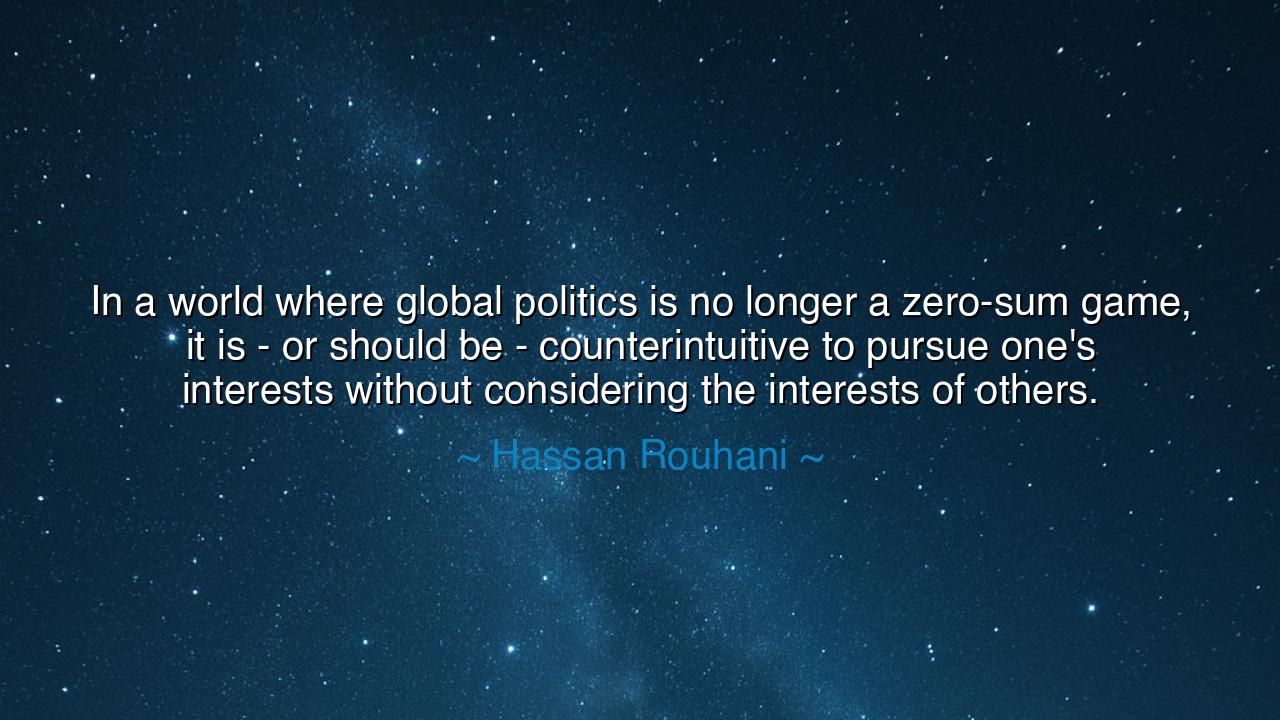
In a world where global politics is no longer a zero-sum game
In a world where global politics is no longer a zero-sum game, it is - or should be - counterintuitive to pursue one's interests without considering the interests of others.






Hear, O heirs of the earth, the words of Hassan Rouhani, who spoke with the wisdom of one who had seen the fires of nations: “In a world where global politics is no longer a zero-sum game, it is – or should be – counterintuitive to pursue one's interests without considering the interests of others.” This is not only counsel for leaders, but a vision for humanity. For the age of isolated triumphs is gone, and the destiny of each people is bound to the fate of all.
In the ancient days, empires sought to conquer, believing that for one to rise, another must fall. They treated power as a zero-sum game, as though the wealth of one meant only the poverty of another. But in this age of connection—of trade that crosses oceans, of climates that heed no borders, of disease and knowledge alike spreading across the globe—such thinking is folly. What harms one nation soon harms its neighbor, and what uplifts one may lift all.
Consider the story of the Marshall Plan after the Second World War. Europe lay in ruins, its cities broken, its people starving. The United States, rather than exploiting this weakness, chose to invest in rebuilding its allies and even its former foes. Factories rose, economies flourished, and the bonds of cooperation gave birth to decades of stability. In this act was revealed the truth Rouhani speaks: that the pursuit of one’s own interest need not mean the downfall of another, but can become a shared victory.
Yet the temptation of selfishness remains. Leaders who seek only their own advantage breed resentment, conflict, and instability. The earth itself groans under such short-sightedness: when one nation pollutes the air, the smoke drifts over all; when one hoards wealth, others are driven to despair and unrest. Thus, the path of considering the interests of others is not idealism, but survival, the true wisdom of an interconnected age.
Therefore, let this teaching be remembered: the destiny of the world is woven as a single fabric. To tear at one thread is to weaken the whole. The greatest leaders are not those who hoard victories, but those who bind nations in mutual flourishing. Rouhani’s words remind us that in the new age, the measure of strength is not in how much one takes, but in how much one gives without diminishing oneself. For in the harmony of peoples lies the only lasting triumph.






TVThiphuong Vi
I really like Rouhani's idea that pursuing one’s interests should not come at the cost of others, but is this the reality in global politics? In practice, many countries still operate as if their success is dependent on others’ failure. How can we change this mindset when it’s so deeply embedded in international relations? What would it take for nations to focus on collective growth and understanding, rather than seeing cooperation as a vulnerability?
PLPhan Linh
Rouhani’s comment seems like an important reminder that our actions on the global stage shouldn’t only serve our own countries. But how does this actually translate into foreign policy? Are countries willing to make sacrifices or compromises for the greater good, or is the temptation of power too great? I wonder how we can move from a world of competition and distrust to one of mutual benefit. Is it even possible without a significant shift in how we view global relationships?
MMDang Thi My Mieu
I can’t help but wonder whether Hassan Rouhani’s viewpoint is idealistic or practical. Global politics has long been driven by the concept of competition, but can we really afford to ignore the interconnectedness of the world today? If every country only cares about its own interests, won’t we end up facing more instability and crises? How do we convince political leaders to think beyond short-term gains and consider the consequences on a global scale?
TNthang nguyenduc
Rouhani’s statement resonates deeply with me, especially in today’s political climate. There seems to be an increasing tendency for world leaders to prioritize national interests without regard for the greater good. Is it possible for global politics to truly evolve into a system where mutual interests are considered? Or is the idea of every country pursuing its own goals inherently ingrained in international relations? Could this shift be more than idealistic thinking, and how would it impact things like trade, climate change, and diplomacy?
THNguyen Thien Huy
This quote by Rouhani is an interesting point about the need for global cooperation. If we all focus on our own interests without considering others, what are we ultimately achieving? Short-term wins, perhaps, but what about long-term sustainability and peace? I wonder if this mindset is something that political leaders genuinely grasp, or are they still stuck in the idea that they can only thrive at the expense of others? Could global politics ever shift toward more altruistic, collaborative strategies?